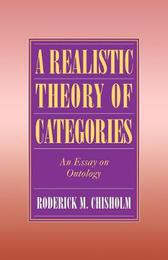
|
A Realistic Theory of Categories: An Essay on Ontology
Paperback / softback
Main Details
| Title |
A Realistic Theory of Categories: An Essay on Ontology
|
| Authors and Contributors |
By (author) Roderick M. Chisholm
|
| Physical Properties |
| Format:Paperback / softback | | Pages:160 | | Dimensions(mm): Height 215,Width 139 |
|
| Category/Genre | Philosophy - metaphysics and ontology |
|---|
| ISBN/Barcode |
9780521556163
|
| Classifications | Dewey:111 |
|---|
| Audience | | Professional & Vocational | |
|---|
| Illustrations |
Worked examples or Exercises
|
|
Publishing Details |
| Publisher |
Cambridge University Press
|
| Imprint |
Cambridge University Press
|
| Publication Date |
28 August 1996 |
| Publication Country |
United Kingdom
|
Description
The book is an original treatise designed to defend an original, non-Aristotelian theory of categories. Chisholm argues that there are necessary things and contingent things; necessary things being things that are not capable of coming into being or passing away. He defends the argument from design, and thus includes the category of necessary substance (God). Further contentions of the essay are that attributes are also necessary beings, but not necessary substances, and that human beings are contingent substances but may not be material substances.
Reviews"Chisholm's approach is characteristically concise... There are ideas aplenty here..." Robert Pasnau, Review of Metaphysics "This is an exciting book of sketches of wrok on various aspects of Chisholm's system as it has progressed since his On Metaphysics (1989)." David B. Martens, Philosophy in Review "...a unique blend of honest, dogged devotion to detail and overarching philosophical vision..." Frederick Kroon, Dialogue "This important book should be read by all who have a serious interest in metaphysics, epistemology, or philosophy of mind. Chisholm's ontological theory is essentially one of great strength and integrity. It is a most impressive and instructive example of how systematic philosophy grounded in formal ontology can be pursued profitably." Gary S. Rosenkrantz, The Philosophical Review
|